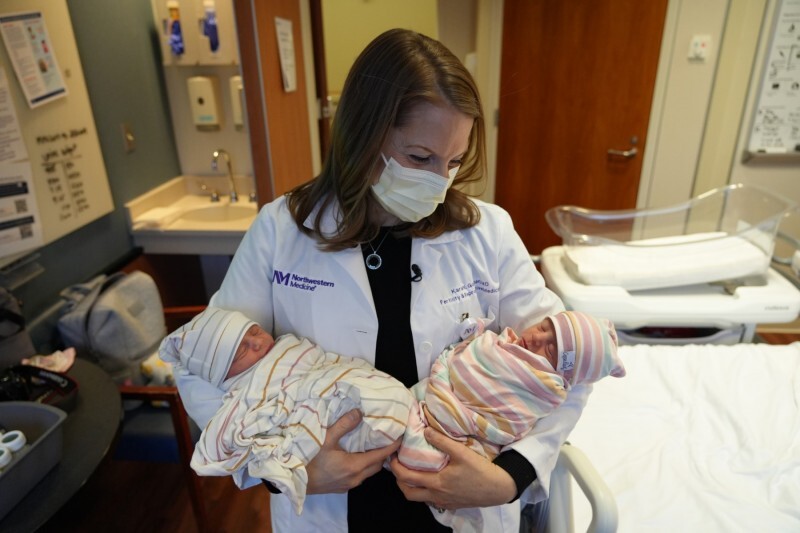


“Despite a breast cancer diagnosis, chemotherapy, and losing both ovaries, Shelly’s dream of having three children came true,” said Dr. Goldman.
In February 2020, Shelly Battista of Arlington Heights, Ill., was breastfeeding her newborn daughter, Emilia, when she felt a lump. She thought it was a clogged milk duct, but when it didn’t get better, Shelly went to the doctor and received a shocking diagnosis.
At 34-years-old, with no family history of breast cancer, Shelly was diagnosed with triple-negative breast cancer and the BRCA1 mutation, which is associated with an increased risk of breast cancer and other types of cancer. Knowing she wanted to have more children, Shelly immediately scheduled an appointment with Kara Goldman, MD, medical director of Fertility Preservation at Northwestern Medicine Center for Fertility and Reproductive Medicine. Shelly’s care team was able to freeze eight embryos (fertilized eggs) before she started cancer treatment.
Shelly went through chemotherapy, followed by a double mastectomy. On Dec. 9, 2020, Shelly’s pathology results came back clear – she was cancer-free. Unfortunately, the chemotherapy treatments resulted in ovarian insufficiency, a condition where the ovaries stop working before age 40. Shelly’s BRCA1 mutation increased her chance of ovarian cancer, so after careful counseling Shelly opted to have her ovaries and fallopian tubes surgically removed.
In December 2021, one year after finishing treatment, Shelly was cleared for pregnancy from a cancer standpoint, and Dr. Goldman prepared Shelly’s uterus for transfer.
“Even without ovaries, we’re able to provide the supplemental hormones necessary for pregnancy. This alone is an important teaching point because many people are surprised to learn that you can use in vitro fertilization to become pregnant even if ovaries have been surgically removed or are no longer functioning,” said Dr. Goldman. “This requires the use of a patient’s previously frozen eggs or embryos, or eggs from an egg donor, so it’s critical that patients at risk of losing their ovaries or losing ovarian function have the opportunity to preserve their fertility.”
When it came time for embryo transfers, the first one didn’t work and neither did the second.
In April 2022, with only six embryos remaining, and Shelly still hoping for two more children, Dr. Goldman transferred another embryo with cautious optimism, knowing that without her ovaries, Shelly had no more eggs to be fertilized.
Dr. Goldman’s positivity paid off. Shelly’s pregnancy test was positive, and at her first ultrasound appointment, Shelly learned she was having identical twin girls.
Shelly BattistaIt’s a true miracle. We have two babies, exactly two-years cancer-free. My heart is very full.
Exactly two years to the day after she was declared cancer-free, Shelly was induced and delivered her identical twin girls, Nina and Margot, at Northwestern Medicine Prentice Women’s Hospital on Dec. 9, 2022.
“Despite a breast cancer diagnosis, chemotherapy, and losing both ovaries, Shelly’s dream of having three children came true,” said Dr. Goldman. “One perfect embryo, frozen urgently before chemotherapy, became two beautiful baby girls. They are the reason why I care so deeply about my patients and my job. Caring for patients during the most vulnerable times of their lives, and helping them build the families they dreamed of, is an incredible privilege.”
“I’m blessed to have a medical team who let me advocate for my medical needs and the future of my family,” said Shelly. “It’s a true miracle. We have two babies, exactly two-years cancer-free. My heart is very full.”